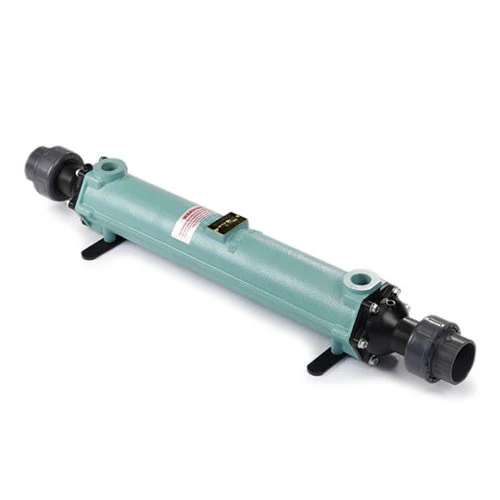Introduction
Swimming pool heat exchangers into the system these devices serve as thermal bridges that transfer heat from an external energy source—like a boiler, solar thermal system, or heat pump—directly into the pool water, all without mixing the two fluids. What makes swimming pool heat exchangers essential is their ability to offer high heat transfer efficiency, corrosion resistance, and long-term reliability, even in chemically treated water like chlorine or saltwater pools.
They are designed to work seamlessly with a wide range of heating systems and are available in various configurations to suit different pool sizes and installation conditions. Whether you’re looking to warm up your private backyard pool, a public swimming facility, or a hotel spa, heat exchangers offer an energy-efficient and durable solution.
Key Features
- Efficient Heat Transfer:
- Pool heat exchangers are engineered to offer high thermal performance.
- They are designed to maximize contact surface area between the hot and cold fluids, allowing for rapid and effective heat exchange.
- This results in faster pool heating and improved energy efficiency, especially beneficial for larger pools.
- Corrosion-Resistant Materials:
- Since pool water can be chlorinated or even salt-based, corrosion resistance is critical.
- Common materials used include:
- Titanium – highly resistant to saltwater corrosion.
- Stainless Steel (SS316 or SS316L) – excellent resistance to chlorinated water.
- Cupronickel – suitable for both fresh and saltwater pools, offering a balance of thermal conductivity and corrosion resistance.
- Using the right material increases the lifespan of the heat exchanger and reduces maintenance costs.
- Easy Installation:
- Most swimming pool heat exchangers are compact and designed for easy integration into new or existing pool systems.
- Standard pipe connections and mounting brackets are provided to simplify setup.
- They can be installed in-line with the pool’s circulation system or in parallel, depending on the design and heating needs.
- High Compatibility:
- Pool heat exchangers are compatible with various heat sources:
- Boilers (gas or electric) for quick heating.
- Solar water heaters for eco-friendly, low-cost heating.
- Heat pumps for high-efficiency, sustainable heating solutions.
- Geothermal systems for consistent, energy-efficient heat supply.
- This versatility allows for optimal energy use based on location, budget, and environmental considerations.
- Pool heat exchangers are compatible with various heat sources:
Types of Swimming Pool Heat Exchangers:
- Shell and Tube Heat Exchangers:
- Consist of a series of tubes (tube bundle) enclosed within a shell.
- Pool water flows through one side, while the heated fluid (e.g., from a boiler) flows on the other side.
- Highly durable and ideal for commercial or large residential pools requiring significant heat load handling.
- Easy to clean and maintain, and available in various configurations and materials.
- Coil Type Heat Exchangers (Spiral/Helical Coil):
- Feature a coiled tube design where the heating medium flows through the coils while the pool water surrounds it.
- Compact and efficient, making them ideal for smaller pools or spas.
- Suitable for lower flow rates and moderate heat demands.
- Easier to install in limited spaces due to their small footprint.
- Plate Heat Exchangers:
- Made up of multiple thin plates that form separate channels for hot and cold fluids.
- Offer extremely high thermal efficiency due to increased surface area and turbulence created by plate geometry.
- Best suited for precise temperature control, as in hot tubs or spas.
- Require good water quality and filtration since narrow passages can be more prone to fouling.
Advantages:
- Maintains Consistent Pool Temperature:
- Helps in regulating water temperature accurately, offering a pleasant swimming experience regardless of ambient weather.
- Especially important in colder regions or for indoor pools.
- Enhances Comfort and Usability:
- Heated water increases the overall enjoyment and comfort for users.
- Enables extended swimming seasons in outdoor pools.
- Extends Swimming Seasons:
- With reliable heating, pools can be used year-round or for extended months beyond summer.
- Especially beneficial for hotels, resorts, and commercial pool owners.
- Fluid Separation for Safety:
- Heat exchangers keep the pool water and heating system fluids completely separate.
- This is crucial when the heating fluid is treated or pressurized, preventing any contamination of pool water.
- Ensures safe, hygienic operation and minimizes chemical imbalances in the pool.
Conclusion
Swimming pool heat exchangers play a vital role in ensuring water temperature control, comfort, and extended usability of swimming pools throughout the year. Their versatile design, compatibility with multiple heating systems, and resistance to corrosive pool environments make them a valuable addition to any pool heating setup.
Whether it’s the robust shell and tube design for large-scale applications, the compact coil type for smaller residential pools, or the high-efficiency plate exchangers for precise temperature control in spas—each type caters to specific needs with reliability and performance. Investing in a quality pool heat exchanger not only boosts comfort but also contributes to energy savings and system longevity.

